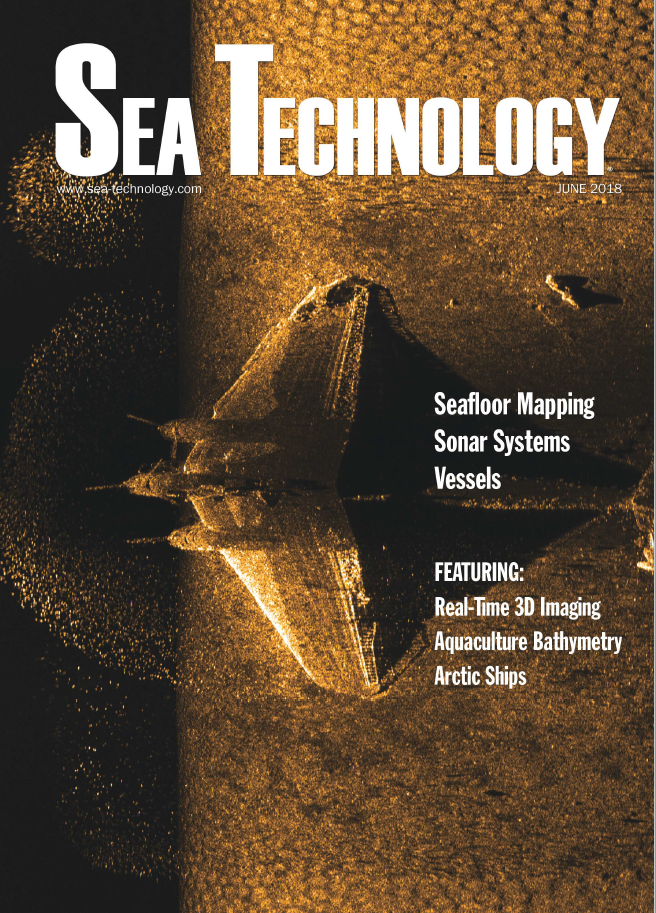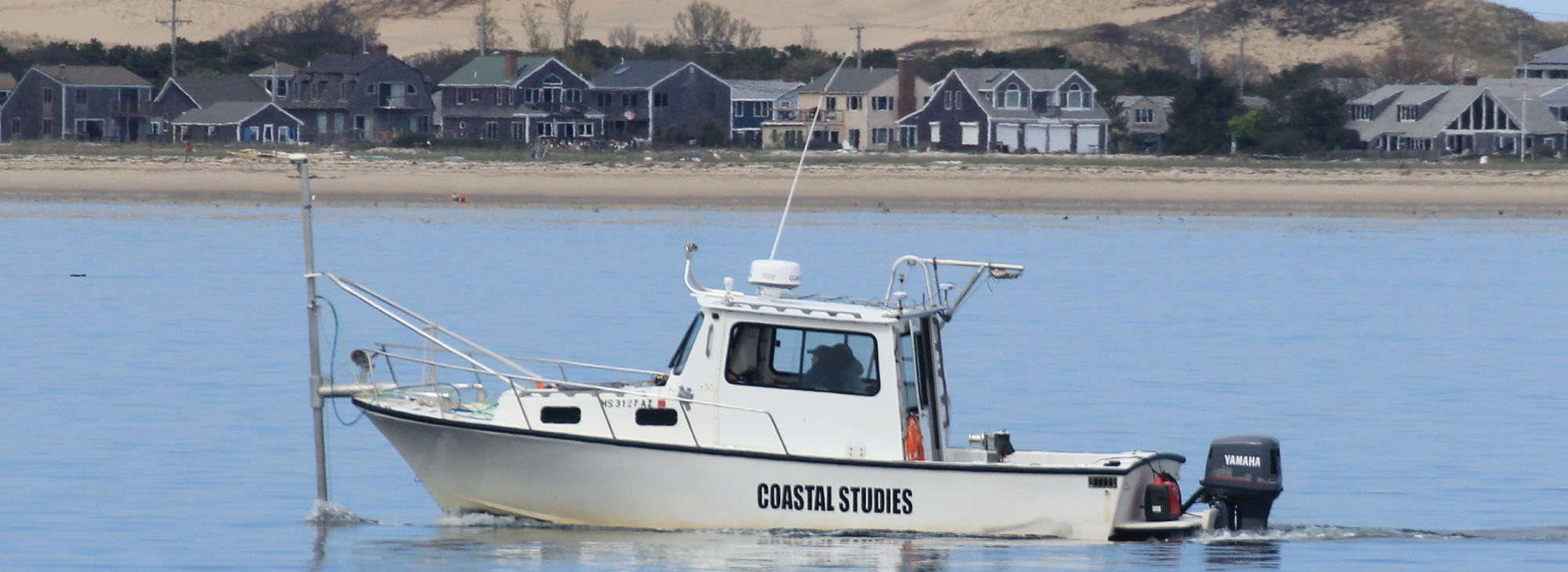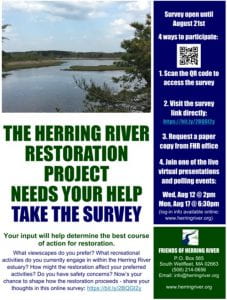#tide #Provincetown #CapeCod #invertebrate #seafood #underwater #scallop #HermitCrab #Gemmagemma #biodiversity #benthos
Category: Uncategorized
Herring River Restoration Project
Coastal Erosion and Climate Change
The CapeLab's work was featured on WCAI, local NPR for the Cape, Coast & Islands.
"In a first-of-its-kind project, the four outer Cape towns are developing a joint coastal management plan. The work in Eastham, Wellfleet, Truro and Provincetown could result in cost savings, larger beach nourishment projects, and more protected and resilient coastal infrastructure, according to project managers. "
Click here for more information.
Sea Level Rise – Emergency Preparedness
Please join us for the final presentation of the Storm Tide Pathway Mapping project that CaPE Lab scientist have completed for the Towns of Scituate and Cohasset through a Municipal Vulnerability Preparedness (MVP) funded grant on Thursday, May 28th at 12:30pm.
The CaPE lab team will detail the findings and how their tide data can be used for emergency preparedness planning related to sea level rise and coastal storm flooding. The presentation to be hosted on Zoom can be accessed through the link on the attached flyer.
Storm Tide Pathways
Join CaPE Lab director Dr. Mark Borrelli and Center for Coastal Studies president and CEO Rich Delaney for a Dockside Chat on Storm Tide Pathways!
They are the low-lying areas that channel flood waters during extreme high tide episodes. These maps and models help vulnerable coastal communities prepare for the inevitable effects of climate-related storm surges and sea level rise on infrastructure and natural resources.
For more information on Storm Tide Pathways visit: https://coastalstudies.org/marine-geology/storm-tide-pathways/
#climatechange #sealevelrise #coastalflooding #coastalgeology #stormsurge #inundationpathway #beprepared
CaPE Lab Receives Funding for 2 Coastal Projects
We are pleased to announce some exciting new projects for which we have received funding. Recently, the CaPE Lab (Provincetown Center for Coastal Studies) was awarded two grants: one for the study and removal of derelict fishing gear and other marine debris, and the other to study and map storm tide pathways.
Marine Debris
NOAA's Marine Debris Program offers funding each year to projects that are committed to the removal and study of marine debris. This year, The Center for Coastal Studies was one recipient of this award, for the removal of 16 tons of gear in both Cape Cod Bay and the Cape Cod National Seashore.
Our part in this project involves the removal of derelict fishing gear (DFG) in both marine (sonar) and terrestrial (UAS) settings. We locate, identify and characterize DFG in both environments, and lead recovery teams will retrieve it. As such, an important part of these efforts will include community outreach and engagement.
NOAA Marine Debris Program 2018 Funding Awards
Storm Tide Pathways
As sea level rises, water will find its way into an increasing number of previously unreached spaces onshore. This will occur during episodic events such as storms (see the blog post regarding January's storm).
According to the state of Massachusetts press release:
"The Cape Cod Cooperative Extension [Provincetown Center for Coastal Studies] will enable the protection of coastal businesses, homes, property and infrastructure by precisely identifying and mapping “storm tide pathways,” the lowest elevation where water will begin to flow inland during a flood event. This project will provide field-verified data on where, when, and how storm surge and floodwaters approach and then inundate coastal communities."
New Report: Feasibility of Harbor-wide Barrier Systems Preliminary Analysis for Boston Harbor
As you may know, Boston faces a serious dilemma with sea level rise, and is one of the American cities predicted to be most affected by rising water levels. Read this article from WBUR for more information on Boston and sea level rise.
Recently, the UMass Boston Sustainable Solutions Lab, a cross department and interdisciplinary collaboration among the schools of UMass Boston, released a report titled Feasibility of Harbor-wide Barrier Systems Preliminary Analysis for Boston Harbor. Dr. Mark Borrelli of The CaPE Lab is one of the authors of this report.
The key recommendation of the report urges the City of Boston to focus on shore based solutions.
You can download the report below, and check out the UMass Boston News article on this report.
Report: Feasibility of Harbor-wide Barrier Systems
UMass Boston News: UMass Bostons Report: Boston Harbor Barrier Costs Would Outweigh the Benefits
 CaPE Lab members Mark Borrelli, Theresa Smith, and Bryan Legare contributed an article to the June 2018 edition of Sea Technology Magazine! Sea Technology is a leading publication in the marine science technology sphere. You can learn more about them here.
CaPE Lab members Mark Borrelli, Theresa Smith, and Bryan Legare contributed an article to the June 2018 edition of Sea Technology Magazine! Sea Technology is a leading publication in the marine science technology sphere. You can learn more about them here.
The article is titled "Mapping Seafloor Shallows: Vessel-based, Nearshore Surveys Using Phase-Measuring Side Scan". It highlights the Lab's use of side scan sonar to measure bathymetry in extremely shallow water, between 0 and 5m depth.
The article can be accessed online here (Flash is required, so make sure to use a browser that supports flash). Skip to page 14 to find the article:
Bryan McCormack Wins 3rd Place Award for Presentation at Research Colloquium
We are very proud of our colleague, Bryan McCormack, for winning 3rd place at the UMass Boston School for the Environment's 6th Annual Environmental Research Colloquium. He was the only undergraduate from UMass Boston to win an award for his oral presentation.
Bryan has worked tirelessly on his undergraduate research at the Balston Beach overwash fan in Truro, Cape Cod. Having worked with him in the field for many long days, I can personally attest to Bryan's tireless work ethic. We are very proud of his accomplishment. Click the link below to view Bryan's presentation.
Mark Borrelli to Give Presentation at NEERS Spring 2018 Conference
On Saturday, April 28th, Dr. Mark Borrelli will be giving a presentation at the New England Estuarine Research Society's 2018 spring meeting, in Portsmouth, New Hampshire. His presentation, titled "A New Method for Calculating Rates of Shoreline Change in a Coastal Embayment With Fringing Salt Marsh" will happen at 10 am.
Click the link to learn more about NEERS.
We hope to see you there!




